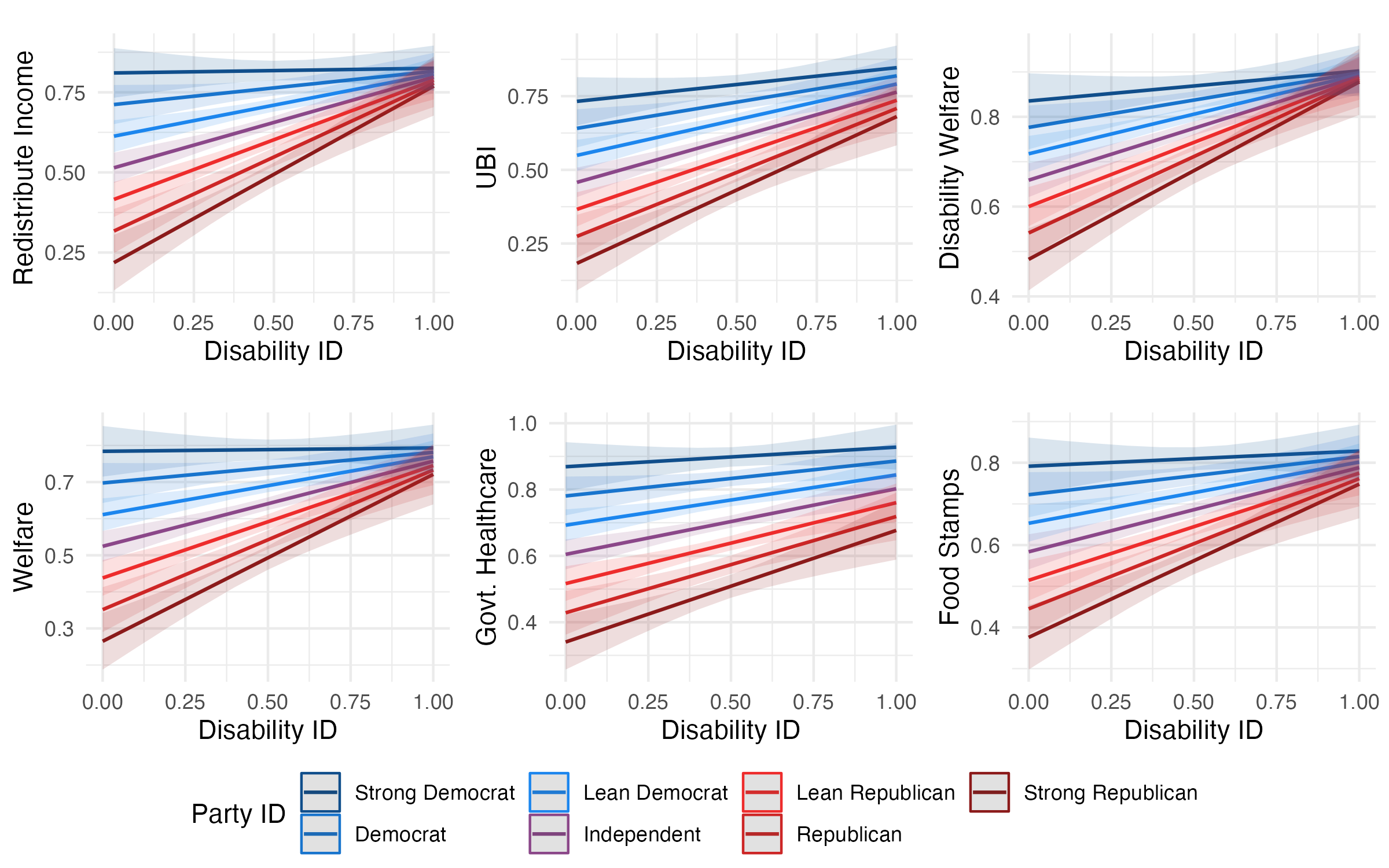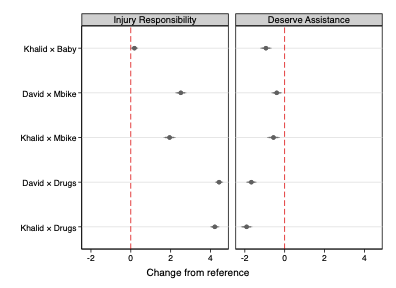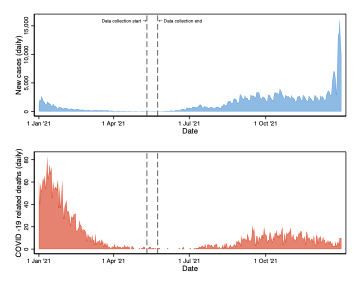Publications, Working Papers, and Works in Progress
Research Overview
I conduct research in public opinion, political psychology, and public policy in the United States and other advanced democracies. The first component of my research agenda examines the role of political processes - such as policy feedback, experiences of discrimination, or exposure to protest action - in cultivating political cohesion within social minority groups. My dissertation and book project examines these processes in the context of people with disabilities in the United States. The second component focuses on the role of group stereotypes, heuristics, and personal experiences of material vulnerability in shaping attitudes toward redistributive and social policies in the United States and other advanced democracies.
Disability as a Political Identity in the United States
Americans with Disabilities and the Identity-to-Politics Link (Job Market Paper)
Paper | Supplementary Materials | Center for Political Studies BlogAbstract
How do social identities become politically salient? People with disabilities (PWD) are a diverse social minority with clear links to politics. However, little is known about how disability might shape political psychology. Conventional wisdom suggests that political cohesion in diverse social groups is a consequence of (1) elite mobilization, and/or (2) intragroup contact. I argue that this conventional wisdom is largely inapplicable to disabled Americans. However, disability may become politically salient via other social processes, including experiences of stigma and discrimination, and processes of policy feedback that link disability to redistributive benefits. I test this theory using data from two original national surveys and the 2024 ANES Pilot Study. I develop an original survey measure for identification with disability - the Disability ID scale - and examine the implications of this identity for political attitudes. I find that Disability ID is strongest among those with more severe and visible impairments, and among those who receive disability welfare and accommodations. Disability ID has important implications for politics, with those higher in Disability ID reporting more ideological liberalism, Democratic partisanship, and support for a range of redistributive policies. Finally, Disability ID is cross-cutting, with the redistributive preferences of conservatives and Republicans converging with those of liberals and Democrats at high levels of Disability ID.
Figure 5: Marginal effect of Disability ID on Redistributive Policy Support by Party ID

Cohesion through Contention: Disability, Identity, and Support for Disruptive Protest Action
Registration | [Paper available upon request]Abstract
What drives support for protest action in diverse social groups, where group members may have different or competing political interests? This paper addresses this question by examining the attitudes of disabled Americans toward disruptive disability rights protests. While such protests are framed as advancing the interests of all disabled people - no matter their specific impairment - they frequently include policy demands that benefit only a subset of disabled people. Disability rights protests thus provide a novel context in which to examine the role of expressive (shared identity) vs. instrumental (personal benefit from policy change) motivations in shaping attitudes toward protest action. In a survey experiment (N=1016) of American adults with disabilities, I find that identification and a sense of linked fate with disabled people predict support for protest action and a willingness to participate, even when such protests are highly disruptive. By contrast, sharing the specific impairment of the protesters (mobility impairment) does not predict elevated support. More broadly, these findings provide novel empirical evidence of group consciousness among large shares of disabled Americans, and show that disabled people are mobilized by exposure to disability rights protests.
Disability and Political Solidarity: The Case of the COVID-19 Pandemic (In Progress)
Abstract
To what extent do public health threats promote political solidarity among members of vulnerable minority groups? People with disabilities (PWD) were at substantially elevated risk of severe illness and death throughout the COVID-19 pandemic. Yet, existing research has not considered how disability status shaped attitudes toward policy interventions designed to curb the spread of the virus (e.g. vaccines, social distancing, masking). Using data from two nationally representative YouGov surveys (N=2000) in the United States, I find that respondents with functional disabilities are not more likely to be vaccinated or support virus-curbing measures than their non-disabled peers. By contrast, among respondents with disabilities, those who consider disability to be an important part of their social identity, and who report a sense of linked fate with PWD are more likely to be vaccinated and more likely to support preventative measures.
Stereotypes, Prejudice, and the Politics of Redistribution
Responsibility for Impairment Shapes the Perceived Deservingness of Welfare Recipients with Disabilities Political Psychology, (2024), 00, 1–24. With Jac Larner.
Paper | RegistrationAbstract
When do people support government assistance for people with disabilities? Disability welfare programs account for large shares of national welfare budgets, but little is known about public attitudes toward disabled welfare claimants. Drawing on psychological research in stereotype content, we argue that attitudes toward welfare for people with dis- abilities are likely to be more conditional than previously acknowledged. In two nationally representative, preregistered survey experiments in Wales (N = 3393) and Scotland (N = 1707), we ask respondents to evaluate the deservingness of a fictitious disabled claimant to government assistance. We manipulate the claimant's outgroup status and the manner in which they acquired their impairment. We find that disabled claimants perceived as even somewhat responsible for their impairments are considered substantially less deserving of government assistance than those perceived not responsible, even when their needs for assistance are identical. Contrary to expectations, we find relatively modest and inconsistent outgroup penalties in perceived deservingness. Finally, we find large heterogeneous treatment effects among respondents holding to more authoritarian social values. These results challenge conventional wisdom regarding the universality of support for disability welfare and help explain why voters may not be inclined to punish politicians who propose cuts to programs for even stereotypically high-deserving groups.
Figure 1: Main Effects by Treatment Condition

Vulnerability Appeals in the COVID-19 Pandemic: Insights from a National Survey Experiment The Journal of Experimental Political Science (2024), 00, 1-16. With Jac Larner.
Paper | RegistrationAbstract
This study explores the impact of vulnerability appeals during the COVID-19 pandemic using a nationally representative, pre-registered survey experiment (N=4,087) conducted in mid-2021. We explore whether providing citizens with information about the vulnerability of ethnic minority and disabled citizens to COVID-19 fosters empathy and increased support for behavioural restrictions. We observe minimal statistically significant or substantive effects, although the presence of subtle effects cannot be entirely ruled out. We identify some limited indications that individuals with disabilities exhibit increased support for restrictions when exposed to information about the vulnerability of disabled people to COVID-19, but these effects are inconsistent. Therefore, our findings provide limited evidence to confirm or rule out that using vulnerability appeals alone is effective for influencing public attitudes toward behavioural restrictions. The findings point toward avenues for future research, including a closer examination of heterogeneous responses to public health messaging among population subgroups.
Figure 2: Timing of Experiment in the COVID-19 Pandemic

Disability Stereotypes and Redistribution in the United States (with Jac Larner, in progress)
Pre-Analysis Plan | RegistrationAbstract
In multiple studies across time and in differing contexts, opposition to state welfare has been linked to beliefs on the demographic composition of welfare recipients. Particular, and almost exclusive, attention has been paid to the share of groups stereotyped as ’undeserving’, namely people from minority ethnic backgrounds and immigrants. In this paper, we test whether eliciting associations between welfare and disabled people - a group frequently stereotyped as highly deserving - increases support for welfare. Using a nationally representative survey experiment conducted in the United States, we employ random assignment to different treatments aimed at providing distinct signals regarding the proportion of welfare recipients who are disabled. Our analysis encompasses both attitudinal shifts and behavioral responses elicited by these treatments.
Estimating the Causal Effect of Acquisition of Disability on Political Partisanship and Support for Redistribution in the United Kingdom (with Jac Larner, in progress)
Abstract
Ageing populations across the developed world have resulted in larger shares of national populations spending more years of life with disabilities and chronic health conditions (Carpenter 2012). How does the acquisition of such conditions shape political behavior? This project utilizes original panel data collected as part of the British Election Study (BES) to estimate the causal effect of acquiring a disabling impairment on political partisanship and support for redistribution in the United Kingdom. In doing so, we contribute to ongoing debates regarding the role of disability and chronic health conditions in shaping political attitudes, and present novel evidence on the political consequences of ageing populations.
Other Publications
Does Disability Shape Political Identity? Center for Political Studies Blog
The American Death Penalty: Progress and Politics Human Rights Defender, (2016), 25 (1), 37 Article